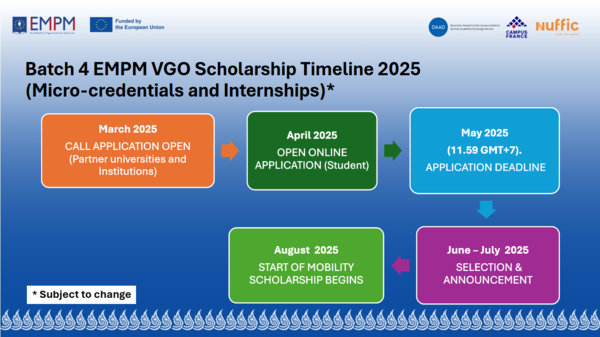The Myanmar Studies Center (MSC) at Palacký University Olomouc (UPOL) has partnered with the European Union Mobility Programme for Myanmar (EMPM), an EU-funded initiative aimed at providing education and training opportunities to Myanmar students. Myanmar students interested in participating in one of the two micro-credential courses (see below) are encouraged to apply.
To start the application process, please send an email to federica.cidale01@upol.cz with your CV and a short motivation letter (half a page max) by 3rd of June 2025. If your application is accepted, we will issue a Letter of Acceptance (LoA). Applicants must then submit the LoA through the EMPM platform to complete the application.
The MSC provides micro-credentials (with a certificate of completion) in two courses (to be attended online):
1. Japan’s Role in International Affairs
This course meets once a week for 2 hours, starting the week of September 22, 2025 (date may vary), and ending the week of December 15, 2025. The specific day and time will be announced later.
Lecturer:
Federica Cidale (federica.cidale01@upol.cz)
Course content:
This course offers an exploration of Japan's position in the international arena, with an emphasis on contemporary global and regional events, as well as Japan's dynamic responses to international challenges. Students will delve into a wide range of topics, including security issues, environmental challenges, foreign policy, human rights, Japan's Indo-Pacific strategy, economic problems, and Japan's foreign relations in the region and beyond. As such, students will learn about regional and global contexts and current developments from Japan's security, domestic, and foreign policy perspectives, fostering a comprehensive understanding of its international role. The course includes various activities, like class debates, essay writing, and oral presentations, aimed at equipping students with solid argumentation skills and inspiring them to think critically.
Topics that will be covered:
- Imperial Japan and Pan-Asianism: Unraveling Modern Repercussions
- Japan's Foreign Policy and Its Role in International Organizations (UN, G7, ASEAN + 3)
- Japan's Bilateral Relations with the US: The US-Japan Alliance and Its Implications
- Japan’s Bilateral Relations with China & South Korea and Apologies in International Politics
- Japan’s Bilateral Relations with ASEAN
- Japan-EU Relations
- Japan's Soft Power: Japanese pop culture and its global influence
- Japan's women, LGBTIQIA+ and minority rights
- Former Prime Minister Shinzo Abe's Legacy
- Japan's Security and Defense Policy: Peacekeeping Missions, QUAD, Indo-Pacific Strategy, and Article 9
- Japan's environmental policies and their global implications
Course requirements:
In order to pass this course, students need to fulfill the following:
- Attendance and active class participation: students are expected to attend 60% of the course (equivalent to around 7 out of 12 lessons) and actively participate in class (20%)
- Presentation: 10-minute individual presentation on a topic of choice followed by a Q&A session (30%)
- Final essay: students' research essay (1500 words) on a topic related to what is discussed in class (50%)
2. Human Rights in Asia
This course meets once a week for 2 hours, starting the week of September 22, 2025 (date may vary), and ending the week of December 15, 2025. The specific day and time will be announced later.
Lecturer:
Kristina Kironska (kristina.kironska@upol.cz)
Course content:
This course provides a comprehensive introduction to human rights and their application in Asian countries. It is designed for both Bachelor and Master students who are interested in understanding the complexities of current human rights issues in Asia, both the achievements (such as the same-sex marriage law in Taiwan) as well as shortcomings (such as the death penalty in many Asian countries).
The course will begin with an overview of the fundamentals of human rights, international human rights treaties, organizations, and courts. We will discuss the concept of "Asian Values" – a phenomenon of the 1990s – and its impact on human rights in the region. We will then delve into various human rights topics in Asian countries, including the death penalty, women's rights, female participation in politics, minority rights, LGBTI rights, migration, asylum, and statelessness. We will also explore the war on drugs (in the Golden Triangle and the Philippines), cyber scams (operating from Myanmar), and various human rights-related situations in Taiwan, Myanmar, North Korea, and many other Asian countries. While the main focus of the course is on East and Southeast Asia, the course will also cover other Asian countries. The students will have to read the provided reading materials and watch four movies/documentaries (The Swimmers, Kim Ji-young: Born 1982, Beyond Utopia, and Pig Butchering Scams) in order to be able to actively participate in the class discussions and debates (there will be two short mock debates, one on Asian values and the other on the death penalty). Each student will also give a short presentation on a course-related topic of her or his choice (12 minutes), such as Feminist leadership, Wrongful convictions in Taiwan, Genocide in Cambodia, Labor rights in the fast fashion industry in Asia, etc.
Topics that will be covered:
- Course overview and introduction
- The fundamentals of human rights & international treaties and courts
- The concept of Asian values
- Minority rights
- Women's rights, gender equality, and feminism
- Death penalty
- Migration, asylum, and statelessness (1)
- State violence
- LGBTI rights
- War on drugs and cyber scamming
Course requirements:
In order to pass this course, students need to fulfill the following:
- Attendance and class activity: participate in all classes and actively join the discussions (no more than 3 absences)
- Class presentation: sign up for a topic (find your own angle/issue), 12-minute presentation
- Exam: fill in 4 out of 5 short essay-style questions (receive at least 60% on the test)
Not fulfilling one of the above will result in not passing the course.
